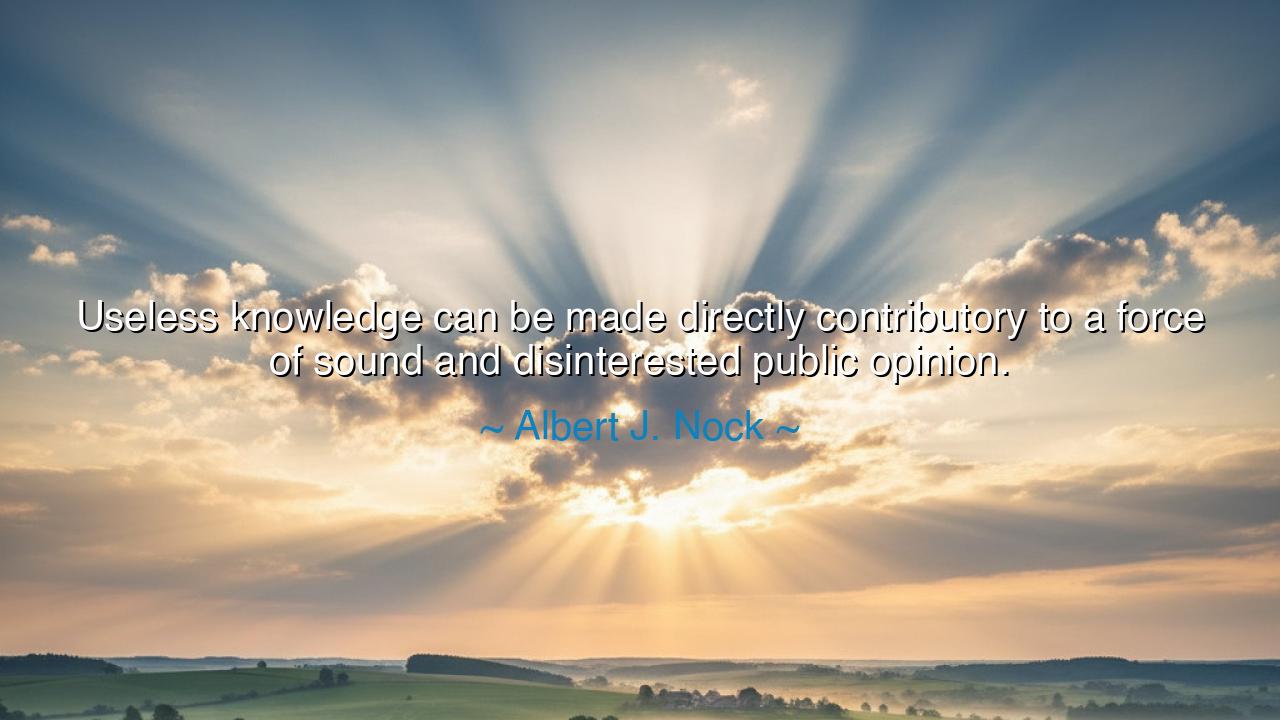
Useless knowledge can be made directly contributory to a force of
Useless knowledge can be made directly contributory to a force of sound and disinterested public opinion.






The words of Albert J. Nock carry a quiet but profound warning to the spirit of every age. When he spoke of “useless knowledge,” he did not mean knowledge without value, but rather knowledge that seems detached from immediate purpose — the poetry, the philosophy, the study of forgotten history, the contemplation of stars and souls. In an era obsessed with machines and money, Nock reminded the world that such knowledge, though seemingly impractical, is the soil from which a “sound and disinterested public opinion” can grow. For only those who have learned for the sake of truth itself can rise above the noise of prejudice and self-interest to guide a society toward justice and wisdom.
In the ancient academies of Greece, knowledge was not pursued for gain but for the cultivation of the soul. Socrates, barefoot and poor, asked questions not to build wealth but to build conscience. His dialogues, seemingly “useless,” taught generations to think — and through thought, to rule themselves. It was such “useless knowledge” that birthed democracy, ethics, and philosophy. For knowledge that seeks no profit becomes the guardian of freedom; it trains the mind to judge without fear or favor, to discern truth even when it stands against power.
Nock, who lived through the restless tides of industrialization and mass opinion, saw how utility had enslaved thought. He watched as education became a tool for employment rather than enlightenment, and how people, trained to serve systems, forgot how to think independently. He feared a world where all knowledge must justify itself by what it produces in the marketplace. Thus, his call was revolutionary — to defend the sacred uselessness of wisdom, for in that uselessness lies the power to resist corruption, propaganda, and tyranny.
Consider the story of Galileo Galilei, who studied the stars not for money or fame, but from pure wonder. His knowledge seemed useless to kings and priests — what profit was there in distant planets? Yet his discoveries reshaped the human understanding of the universe and weakened the chains of blind authority. The same “useless” pursuit of truth became the foundation of science, progress, and reason. From such examples we learn that knowledge without immediate use often becomes the foundation of civilization itself.
So too, in the hearts of poets and thinkers, we find the same truth. When John Milton wrote Areopagitica, defending the freedom of speech, he was not writing for wealth, but for the soul of a nation. His words, born of useless scholarship and divine conviction, still echo in every constitution that values liberty. The power of public opinion, when purified by wisdom, can become the mightiest of forces — stronger than armies, more enduring than empires.
This quote also reminds us that a “disinterested public opinion” — one free from selfish motive — cannot be formed by ignorance or utility alone. It requires citizens who have read beyond their needs, who have thought beyond their comforts, and who have loved truth for its own sake. Only such souls can stand unmoved by lies or flattery. The cultivation of useless knowledge thus becomes an act of moral preparation — a forging of the conscience that protects the weak and restrains the powerful.
Therefore, let us not despise what seems impractical. Let us read poetry, study history, ponder philosophy, gaze at the stars — for these “useless” pursuits refine the inner life that gives meaning to all practical deeds. Albert J. Nock’s wisdom teaches that knowledge pursued without reward becomes the root of all virtue. When a people learn not merely to work, but to understand; not merely to earn, but to discern — then from their hearts will rise a public opinion that is sound, pure, and just, the true foundation of any lasting civilization.






AAdministratorAdministrator
Welcome, honored guests. Please leave a comment, we will respond soon